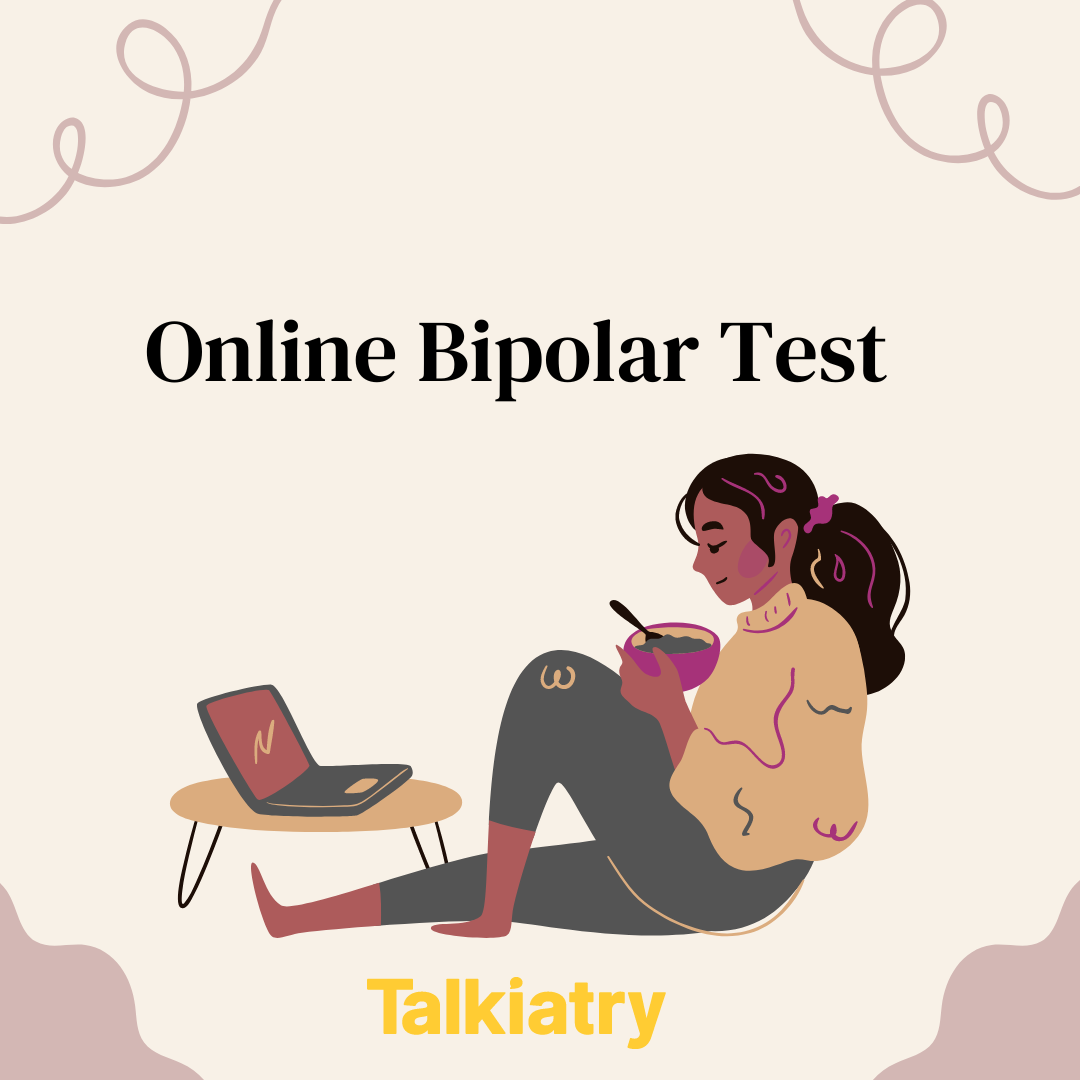Rapid-cycling bipolar disorder is one of the more severe forms of bipolar disorder, as it can seriously impair a person’s ability to function and impede their overall quality of life. The term generally applies to those who go through four or more episodes (i.e., mood swings) within a year. These episodes may entail symptoms of depression, mania, and hypomania.
Online Psychiatry Covered By Insurance
Talkiatry can match you with a real psychiatrist who takes your insurance and is seeing new patients. They’re in-network with major insurers and offer medication management. Get started with a short online assessment
What Is Rapid Cycling Bipolar Disorder?
The mood swings associated with rapid-cycling bipolar disorder are generally unpredictable. They can last anywhere from a week to a few months. Rapid cycling is also not considered a formal diagnosis but rather a characterization of the course the illness takes based on timing and duration.
Someone with more rapid mood switches is generally diagnosed with a mixed episode, characteristic of mood instability in borderline personality disorder (BPD).1
What Is Ultra Rapid Cycling Bipolar?
Ultra rapid cycling bipolar disorder is a pattern of very frequent manic episodes. It can come and go at any point in time in the disease and can stop with proper treatment. These episodes can last days or weeks, and can happen at least 4 times a year, usually more frequently.
Characteristics of Rapid Cycling Bipolar
The symptoms of rapid-cycling bipolar disorder are the same as those exhibited in traditional bipolar disorder. As such, someone with rapid-cycle bipolar disorder will experience both manic and depressive episodes.
Manic Episode
Symptoms of a manic episode include the following:
- Feelings of being “high” or elated
- Decreased need for sleep
- Loss of appetite
- Increased rate of speech
- Racing thoughts
- Engaging in risky behaviors such as high-risk sex or excess spending
- Feeling invincible, like they can do anything
In the midst of a manic episode, people may exhibit highly unusual behavior that is unrecognizable to family and peers. They won’t be able to recognize the shift either, insisting that they feel great or are being the best version of themselves.1
Depressive Episode
Symptoms of a depressive episode include the following:
- Feelings of sadness, emptiness, or hopelessness
- Restlessness or a slowed-down feeling
- Trouble falling asleep or sleeping too much
- Increased appetite and weight gain
- Slow speech and forgetfulness
- Inability to carry out even simple tasks
- Little interest in activities and anhedonia (i.e., the inability to experience pleasure)
- Increased thoughts of death or suicide
Someone experiencing a depressive episode may retreat within themselves and temporarily cut off contact with the people in their life. In some cases, this isolation can play a role in job loss, loss of relationships, and in extreme cases, suicide.1
Are Rapid Cycling Mood Shifts Temporary or Permanent?
These cycling mood shifts are temporary, however the cycle itself can happen up to four times a year at least. With the proper treatment, it’s possible for the rapid cycles to end and for cycles of manic episodes to decrease in duration and frequency.
What Causes Rapid Cycling?
Experts are unsure what exactly causes traditional or rapid-cycling bipolar disorder. However, many of the potential causes or triggers of rapid-cycling are similar to those of traditional bipolar disorder.
Kindling / Sensitization to Stress
Stress and being sensitive to changes in your life, such as a new job, move, or anything else can be a trigger. It’s important to understand that our brains are delicate and may not know how to manage life changes, perceiving even good changes as stress. The positive or negative situations matter less than the fact that any change can be hard to adjust to, but negative ones do show more symptoms.
Hypothyroidism
Hypothyroidism can be a trigger for rapid cycles. In hypothyroidism, the thyroid does not produce enough hormones, which then impacts the brain and the way it processes information, leading to rapid cycles. Proper maintenance for hypothyroidism is important to ensure that moods are managed and stable.
Antidepressants
Beginning or ending medications can also trigger a rapid cycle. Depending on the medication, it can make symptoms worse. Mood stabilizing medications help to ensure that triggers are at bay, however antidepressants without these medications can cause an array of symptoms. In general, people with bipolar disorder should never only be prescribed antidepressants as these medications can throw them into a manic cycle.
Risk Factors for Rapid-Cycling Bipolar Disorder
Although it is difficult to identify who is most at risk, there are several common risk factors associated with rapid-cycling bipolar disorder, including the following:
- Sex: women seem to be at a higher risk for developing rapid-cycling bipolar disorder. This may be attributed to hormonal changes during menstrual cycles or postpartum bipolar.
- Age: people who develop bipolar disorder at a younger age (adolescence) are more likely to develop rapid cycles.
- Type of bipolar: those people diagnosed with bipolar 2 may be more likely to experience rapid cycles.
Depressive episode at onset: those who experience a depressive episode at the onset of their bipolar disorder are more likely to develop rapid cycles.
Help For Bipolar Disorder
Online Psychiarty For Bipolar Disorder – Talkiatry can match you with a real psychiatrist who takes your insurance and is seeing new patients. They’re in-network with major insurers and offer medication management. Most psychiatry visits cost patients $30 or less* Free Assessment
Talk Therapy – Get help from a licensed therapist that has expertise with bipolar. BetterHelp offers online therapy starting at $65 per week. Visit BetterHelp
*Includes copayment, deductible, coinsurance, and $0 Visits. Excludes no shows.
What Are the Effects of Rapid-Cycling Bipolar Disorder?
Those suffering from rapid-cycling bipolar disorder are at a greater risk of alcohol and substance misuse. Many people with this condition self-medicate to cope with or alleviate their symptoms. They’re also at an increased risk for suicide and self-harm. Generally, because mood swings occur at such a high volume, rapid cyclers find it difficult to commit to a set schedule, which makes it almost impossible to get or keep a job.3
How Is Rapid Cycling Bipolar Disorder Diagnosed?
Medical and psychological professionals can diagnose bipolar disorder and any other subtype of bipolar disorder, including rapid cycling bipolar disorder. Trying to diagnose rapid cycling bipolar disorder can be tough as the period of time it takes to diagnose is at least a year, as the cycles are measured yearly.
Episodes can come and dissipate without fully being over so it can be hard to identify and easy to miss when this happens. The doctor or mental health professional should speak with the patient and get their self-report of symptoms and also speak with loved ones to gather their observations.
How Is Bipolar Disorder With Rapid Cycling Treated?
Rapid-cycling bipolar disorder is more difficult to treat than when treating traditional bipolar disorder; however, certain medications and therapy options may prove effective.
What’s the Best Medication for Rapid Cycling Bipolar?
Medications for bipolar include mood stabilizers, which when combined with an antipsychotic, can help people manage symptoms of mania and hypomania. Lithium is the primary form of mood-stabilizing treatment, as well as Depakote, Lamictal, or Tegretol.
Antidepressants, on the other hand, have been shown to be ineffective, and may actually lead to an increased speed of cycling. Taking antidepressants can be dangerous in a person with bipolar disorder and lead to mood destabilization.5
Therapy for Rapid Cycling Bipolar
Medication is the primary form of treatment to manage symptoms, but it is always preferable to combine medication with a form of talk therapy like cognitive behavioral therapy (CBT).4 To find a therapist who specializes in the treatment of bipolar, consider using an online therapist directory.
Coping With Rapid Cycling Bipolar Disorder
Coping with rapid cycle bipolar disorder can be tough and can leave people feeling more depressed and hopeless due to the frequency of manic episodes. It’s important to stay on a treatment regimen and make sure you are talking to your medical team about changes to your mood or any changes happening in your life, such as avoiding alcohol. Therapy and medication are the first line treatment as well as lifestyle changes.
It’s also important to begin journaling about your moods and symptoms and understanding when moods happen, what is happening in the environment, what time they happen, and how long they last. It can give insights into potential triggers or causes that were not noticed before. Having a support system of family and friends you can talk to is also important, as the disease impacts your relationship and the people around you as well.
Final Thoughts on Bipolar Disorder With Rapid Cycling
Everyone’s experience with traditional bipolar or rapid-cycling bipolar disorder is personal, which can feel isolating. But remember, you’re not alone. Connecting with a skilled therapist or mental health professional can help, becoming the foundation of a strong support system. With support and the right medication, you can lead a healthy and fulfilling life.
Additional Resources
Education is just the first step on our path to improved mental health and emotional wellness. To help our readers take the next step in their journey, Choosing Therapy has partnered with leaders in mental health and wellness. Choosing Therapy may be compensated for marketing by the companies mentioned below.
Online Psychiatry For Bipolar Disorder
Talkiatry – Our Psychiatrsts Can Diagnose Your Condition, Prescribe Medication, And Monitor Your Progress. Most psychiatry visits cost patients $30 or less* Free Assessment
Talk Therapy
Online-Therapy.com – Get support and guidance from a licensed therapist. Online-Therapy.com provides 45 minute weekly video sessions and unlimited text messaging with your therapist for only $64/week. Get started
Starting Therapy Newsletter
A free newsletter for those interested in learning about therapy and how to get the most benefits out of therapy. Get helpful tips and the latest information. Sign Up
DBT Skills Course
Jones Mindful Living Dialectical Behavior Therapy (DBT) is a popular treatment for BPD. Learn DBT skills with live weekly classes and online video courses for only $19 per month. Free One Week Trial
Choosing Therapy Directory
You can search for therapists by specialty, experience, insurance, or price, and location. Find a therapist today.
*Includes all types of patient cost: copayment, deductible, and coinsurance. Excludes no shows and includes $0 Visits
Online Bipolar Test A few questions from Talkiatry can help you understand your symptoms and give you a recommendation for what to do next. Best Online Psychiatry Services Online psychiatry, sometimes called telepsychiatry, platforms offer medication management by phone, video, or secure messaging for a variety of mental health conditions. In some cases, online psychiatry may be more affordable than seeing an in-person provider. Mental health treatment has expanded to include many online psychiatry and therapy services. With so many choices, it can feel overwhelming to find the one that is right for you.

Find a therapist for bipolar disorder
Get the help you need from a therapist near you
City or zip Search








